On Friday night, I attended a special event at one of my new favorite yoga studios, Dupont Circle’s Tranquil Space. This studio and Down Dog Yoga in Georgetown have become my favorite places to practice, unwind, and come home here in D.C. (They’re incredibly different, so it’s easy to enjoy them both individually, and they work in alternating ways with my schedule.) Tranquil Space reminds me a lot of my beloved Laughing Lotus in NYC: the quality of instruction is hands on and thoughtful, workshops and special classes abound, there’s a lot of creative diversity in the teaching, and, most of all, the studio walks a lovely line between crunchy and classy.
What makes me even more at home at Tranquil Space is the support that Kimberly Wilson, TS’s founder, shows to animals. On Friday night, she hosted a benefit for farm animals featuring The Washington DC Humane Society, Pig Sanctuary, and Farm Sanctuary. On the premise was at least one four-legged friend:
Also present was Gene Bauer, the founder ofFarm Sanctuary, whom I’d met before, but never spoken to until this evening. Mr. Bauer is affable, enthusiastic, and intelligent, and his work speaks for itself. Farm Sanctuary (in Watkins Glen, NY) was started in 1986, and it helped to galvanize the movement of animal havens that now grace our country from coast to coast. Mr. Bauer is also friends with Kris, Brendan, and other good friends of mine, so we had plenty to chat about.
When he rose to speak to a room full of receptive yogis, Mr. Bauer highlighted many things: the growth of the animal rights movement, the explosion of veganism in the last few years (he recalled how, when he was eating vegan in 1985, soy milk was so scarce that most vegans poured juice over cereal; compare that to the non-dairy options today!), and the significance of compassion. Most of all, he spoke about how each of us can set an example for positive change (be that toward a vegan lifestyle, or simply toward increased awareness and reduction of animal food) without alienating the people we’re trying to reach. To illustrate this point, he used a quote I loved: “bring them to their senses, not to their knees.”
I can’t think of a better way to capture what it means to be an “advocate.” And this certainly got me thinking about how I should write, and how I should share my ethics with the world. Mr. Bauer mentioned that one important strategy is to always talk to people at their own level: you can’t approach someone who’s just learned to cook and talk to them about the nuances of making a perfect soufflé; you can’t bombard someone who’s just learning to be vegetarian with information about going all raw.
You can’t, in other words, forget that other people’s journeys are their own. This is something I often remind myself of when I’m talking to family and friends: I can chat with my mostly vegetarian, mostly whole foods eating friends about a raw entrée, but it’s not something I can do with my Mom, who still eats an omnivorous diet, but is working on making it healthier. Instead, I talk to her about whole grains vs. refined, and almond milk vs. conventional dairy. That’s a triumph in its own right, and worth celebrating.
The next speaker was a representative from the Washington Humane Society, who speaks to children about animal rights and animal cruelty. Apparently, she’s often sent to inner city schools, where she faces the task of trying to make compassion for animals feel relevant and real to kids who have often been denied compassion themselves: kids who have slipped through the cracks in social services and foster care. What an unbelievably challenging job. One thing the speaker noted was that the suffering these kids have confronted at home is in fact often the key to unlocking their sympathy for animals. She also noted that, when she started animal rights work, she often found herself frustrated with people, and interested only in the lives of animals. “To be an animal person,” she noted, “you have to be a people person, too.”
This was the other take home message of the night: interest in animal welfare should never preclude the capacity to extend compassion and sympathy to other people, too—even when you’re butting up against ignorance or cruelty. I so admire the men and women who do animal rights work without ever losing their patience or sympathy or basic courtesy to human animals. I hope I manage to do the same.
What do you think of bringing people to their senses, rather than their knees? How do you manage to set an example while also remembering to be compassionate?
xo
This post may contain affiliate links. If you use these links to buy something I may earn a commission. Visit my privacy policy to learn more.

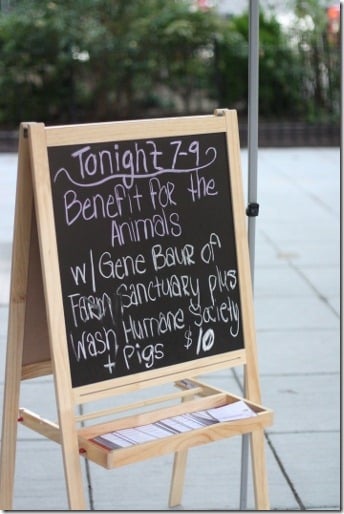
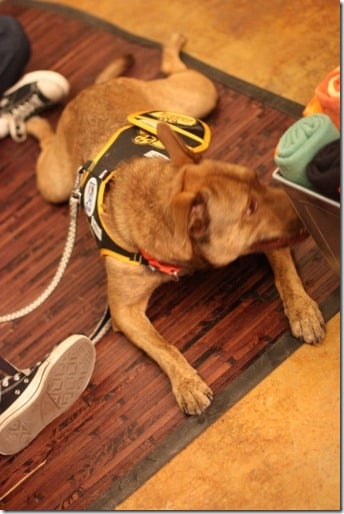
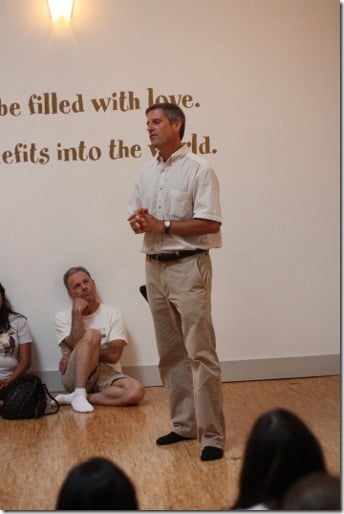
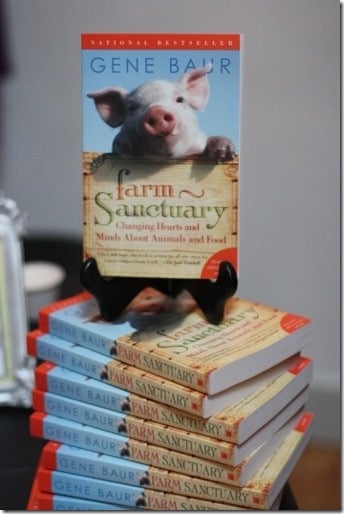
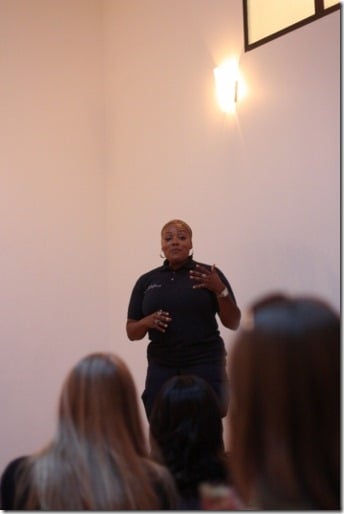
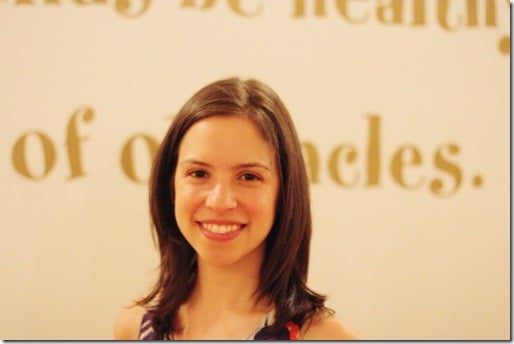
Leave a Comment
love this post. what a cool night! I’m especially inspired by the representative of the Washington Humane Society who speaks to inner city students about animal rights. how awesome–and potentially empowering for those students!
“Knock them to their senses, not their knees”
Best way to sum up living a compassionate life
Thank you Gena 🙂
PS
Even more than the recap, I loved your response to Alexis and her reply
I really enjoyed this recap of your night – you focused on some wonderful points and I especially appreciated this gentle, kind approach to life and people. I think that the idea of approaching people where they are is an example of compassion that should be extended to all aspects of life, not just in eating and vegetarianism – and as such I love that that was something that Gene Bauer stressed. I think that dovetails so well with the subsequent idea that in order to be an animal person, you need to be a people person too. It really pains me to see PETA campaigns that are attempting to prevent cruelty against animals while encouraging cruelty against human beings – I find those messages to be quite antithetical, but being an animal person AND a people person means that that principles that guide your eating style are merely an extension of the principles that guide your entire life, and i think that consistency is important and valuable. i really enjoyed reading this because it made me think a lot about being a person rather than just being a vegetarian.
On a sidenote, I was wondering what your opinion is on tribes or groups of ethnic peoples who prize their livestock and sustain themselves off of the livestock they raise – i.e. native american tribes who prized bison – ate their meat, use their hide for blankets, rugs, clothes, warmth; used their bones to build canoes, etc. Are there exceptions to your moral philosophy of vegetarianism when it comes to specific circumstances?
There’s so much truth to the idea that we need to respect everyone’s journey. I only talk to people about food when they’ve shown an interest; it’s amazing how many people at work have asked me questions about my (very large and very eclectic) packed lunches. re: compassion and animals, I think that developing relationships with animals can definitely awaken compassion. I watched some very disadvantaged kids hold ducklings with so much gentleness that it brought tears to my eyes. There are some amazing dog-training programs going on in prisons that seem to be having a huge effect on prisoner-to-prisoner violence.
Love this post!
“I so admire the men and women who do animal rights work without ever losing their patience or sympathy or basic courtesy to human animals.”
I really love the point you make here. When I’ve volunteered at animal shelters, it’s always made me sad when some of the volunteers are so passionate about the animals that they become borderline misanthropic. Granted, I may desire to throttle people who abuse animals, but taking the default stance of “99% of people don’t give a damn” is really shortsighted and self righteous. And does nothing to encourage people to fight against animal cruelty.
I also really agree with bringing people to their senses and not their knees…love the message and the word play. Heh, bringing people to their knees only works if they are bowing in reverence. Which would freak me out more than anything 😉
I think that’s an important point. It takes a lot of time to learn a new way of thinking- just like your experience learning science! I also think a healthy dose of humility is important. There are a LOT of issues we all need to be enlightened about in the realms of social justice, economic justice, environmental justice, etc. ALL of us buy and use products that exploit others in some way (the fact that this communication is online is one example)… it’s just a fact of our modern world, and we’re all fighting back in different and important ways.
I love Tranquil Space!
Great post.
I was wondering if you could expand on your views of morality, since you have mentioned many times how you view your veganism as rooted in your moral viewpoint. I tend to agree with a lot of your sentiments, but from a philosophy of morality standpoint I see how troubled notions of “right” and “wrong” can be when you search for their philosophical ground.
Where do you view the moral authority of your views as coming from? Do you have a consequentialist view? Or deontological? If you have a deontological/categorical view, what do you view as the source of those rules? Some spiritual authority? Kantian reason? Moral intuitions? (if so what is the source of these intuitions? And why do they often conflict? How can we build rules out of these intuitions?) Do you think we can really have a fully systematized morality in light of the fact that philosophers have struggled for so long to come up with any exceptionless rules or formulas for morality? Do we have to recognize that there is an arbitrary aspect to our process of moral reasoning?
I’m not sure if you are interested in the philosophy of morals so maybe those are meaningless questions to you, but for me, it’s the most important part of any discussion of moral views, so I wanted to hear your thoughts.
Alexis,
I love this comment, and I’m afraid that you’re going to be totally disappointed with my answer, which is that I have very little by the way of philosophical vocabulary. I studied philosophy with great interest as a high school student, and I’ve since lost touch with it; I have a fairly decent understanding of the history of philosophy, but practically no capacity for discourse, which is why nearly every phrase you just mentioned is foreign to me. Given my ignorance, I’d do well not to use terms like “morals” on my blog, as I, too, know that it’s very difficult to talk about moral right and wrong when one is not married to a particular religious world view (which I am not) or a particular moral system that is secular in nature (for example, seeing all ethics as being derived from law or government).
So let’s pretend for a moment that I’d been smarter, and used words less loaded than “morals.” I think it’s possible to have a sense of right and wrong that is well formed but does not derive directly from a philosophical system; I have no philosophical system to speak of (ie., I’m not religious, I like Kant but I don’t subscribe to Kantian reason wholesale, etc.), but I do nevertheless have a sense, as I think most people do, of how I think I (and, if I’m being totally honest, others) ought to behave to minimize cruelty or suffering. I don’t fool myself into believing that my set of moral intuitions (for indeed, that’s the most accurate way to describe them) are always consistent, but they’re the best I can do. I have moments of feeling real sympathy for relativism, but ultimately I think there are certain violations of human and animal rights that are simply “wrong” by my standards.
Now, do I realize that my intuitions may be wrong, and meaningless, and simply formed by culture and life experience? Sure. Any of the things I tend to think (and I say “tend to” because I also admit that I make moral exceptions sometimes) are “wrong”–theft, rape, murder, betrayal, etc.–might actually not be, because everyone’s moral intuition may be arbitrary and artificial. But we’ll never really know, will we, if there is such a thing as right and wrong, and in the meantime don’t we all have to just figure out how to live? If I think anything is “wrong,” I think factory farming is wrong; that may all be my own delusion, but I’m living in the world nonetheless, and often charged with decision making, and something has to govern how I decide. So, within my moral universe, if you will, this is where I stand.
Told you it would be an amateurish answer. I’m sorry not to be more sophisticated here, but love that you asked me!
G
Thanks for the thoughtful answer, Gena. I’m totally with you – I think on some level we have to accept a moral pluralism (which I think is related to your ideas in this post about not being aggressively or viciously self-righteous), and we have to accept some level of arbitrariness or constructedness, but we also have to make decisions and act in our lives, and in order for that to be meaningful, I think we have to build as much coherence as we can/need out of our moral intuitions and experiences.
This is a great quote. I especially appreciate the analogy between kindness to humans and animals.
I appreciate this post – thanks, Gena. I understand what you mean about talking to people where they are in life. Three years ago, if someone talked to me about chia seeds, sprouted grain bread, and John Robbins, I’d have thought they were crazy. Sometimes those of us who seek out tons of information on food, nutrition, and animals forget that others may have not done the same. It doesn’t mean that they may not possibly get there on their own one day; it just means that’s not where they are at the moment.
I almost wish more people asked me about why I am veg*n. Instead, the most popular question has been “what does your husband do?”
Ahh, words I should take to heart! It’s so easy to lose my head when I talk to people about animal rights, because it means so much to me. I’m far better about it now, but it’s always a work in progress. And it’s so important to remember that the vast majority of people hate animal cruelty, but we also tend to recoil at the idea of change. That’s why small steps, not crazy leaps, tend to be the best way to go. Unless you’re a crazy leap kinda person!
One of these days I’m gonna have to go road trippin’ to a farm sanctuary.
I’ve loved reading your farm sanctuary posts, and can’t wait to read Gene Baur’s book. Kudos to whoever designed that cover – it’s irresistable! I’m already imagining it on the coffee table.
like the thinking behind “bring them to their senses, not their knees.” It is hard to imagine the knowledge of how the animals we eat are treated not evoking a response of compassion.
I think we have to trust people to make their own decisions about how to eat once they know where their food really comes from. I like the language “everyone’s on their own journey.” I don’t, however, like the idea of talking to people at the “level” they are at – it’s not that I don’t think we progress in moral life (I do think we can speak of “stages” of morality) – it’s just that in my own moral and philosophical framework, “vegans” do not occupy the high ground, and I do take umbrage with the assumption that because I (consciously) choose to wear wool, eat honey, etc., etc., I am a moral adolescent and need to be treated as such.
Because we all come from different places, and have different world views, etc., it is very hard, when someone comes at you with a strong argument, not to retaliate with the same. Which may be why Peter Singer’s Animal Liberation did nothing at all to evolve my eating style in a more compassionate direction. Because my intellectual defenses were mounted throughout. While, ironically enough, Michael Pollan’s books have had enormous impact.
I will say, as a result of my encounter with veganism, I feel a need to “defend” my non-vegan choices. I don’t think this is a bad thing, however, as I do desire, to the extent possible, for my choices to support a world in which there is less suffering all around.
Elizabeth,
By levels, I didn’t mean that there is a moral hierarchy in which vegans are higher and everyone else is less progressed (though I see how you got there, because the word “level” does by nature imply a ranking!). I really meant that, when you talk to people about changing their lifestyles, you take into account who they are and how they live. Which is why I used the example of my Mom: she was eating a ton of processed food and very little plant-based meals a few years ago, so it was obviously impossible for me to sell her on green juice or the idea of a farmer’s market. But it was feasible to show her a carton of almond milk and talk about the differences between white bread and a loaf of whole grain.
Not my clearest work (I write quickly these days) but the comment was more in recognition of the fact that, outside of our *very* small community of very conscious eaters, a lot of people find this information utterly foreign, so you start a dialog by remembering where they are and how they eat NOW. It wasn’t meant to put people who are already eating with consciousness and thought into an ethical ladder.
🙂
The tricky thing with veganism is that because it appears that you are already out on a huge judgement limb, people can sometimes assume that it’s an attach or that you want to fight.
Personally, I think you have to work from the ground up on this one. I’m not 100% vegan and I’m testing out where I’m going to end up sitting on that front, to make the best choice for me. On that basis, it becomes more natural to accept that when meat eaters in my life enjoy something I make that is vegan that’s a big step for them, and, as you say, it’s only through bringing people to their senses that will eventually find their own way to becoming more plant-based (hopefully).
Also, thank you again and again for raising the wider issues of what we put in our mouths here, Gena. I find it incredibly helpful!
I loved this. I know that I struggle meeting people where they are. “to be an animal person you have to be a people person”- so so true. I often come across as an “angry vegan”, and I know this. It is hard to quell the passion often times for me. But as the saying goes, you can catch far more flies with honey than with vinegar. I feel that you always come across with compassion and lightness when you talk about veganism, and I really admire and respect that. I am working to be more like that. It is an important issue that needs more talk, but compassion has to be where we are coming from in order to make people feel safe, so that they will actually sit and hear you out.
What a beautiful post with so many good points raised!
Since working at a vegan restaurant this summer, I notice both people who talk to me in a level way, who are not condescending or ignorant. But more often than not, I’ve met vegans who cross the line and say things to me that bother me. I have to remember that it’s not necessary to be that way, and I will continue to make decisions on my own that are best for me.
Spreading a message, at a time and level that is appropriate for the recipient of the information is a worthy goal. I once had a colleague who’s saying was “Sometimes you have to burn bridges to build bridges.” This is not my approach, so your quote will be a memorable one for me.
That is a fantastic quote, and one that will stay with me.
I definitely know some people who love their animals, and animals in general, much more than humans: it’s a kind of escapism, and doesn’t really help with espousing a message.
Since I live with omnivores (there are maybe two other vegans in town, and neither one is in my family!) I have to be really careful about treading the line. I’m not a proselytizer by nature anyway: I’m too good at seeing other points of view for that (not necessarily an asset). But the small steps and small changes is definitely the stuff revolution is made of. I love the parallel with neglected children also.
you look so beautiful in the picture. I definitely want to pick up this book!
I was at the event too (and appreciated your comment!) and got chills when Gene said the part about bringing them to their senses, not to their knees. So much perspective and inspiration in just a few words.
I wanted to ask him how he battles activist fatigue (i.e. I’ve seen just about every Mercy for Animals and PETA video, plus Earthlings, and I know it’s important but it just makes me SO very sad or when I talk to people and they get really combative). Sometimes it feels like I just can’t see one more thing or try to convince one more person without falling apart.
I wish there had been much more time but I was really grateful for having the chance to be there and for Kimberly for hosting it!
That bit about talking to people on their same level really strikes me. I guess I was starting to figure it out naturally, as you can usually see the differences in reactions when you talk about certain things to certain people. But I guess I never identified it like that. It wasn’t so clear, and now, having it said like that makes it come together. I’ll definitely be keeping that in mind more actively. Nice post!
“I so admire the men and women who do animal rights work without ever losing their patience or sympathy or basic courtesy to human animals.” – Wonderful point and so true! Something I’m trying to get better at every day.
I try to set a good example in enjoying and benefiting from a whole foods vegan diet, but I never pick debates or judge other people in conversation. I try to remain as positive as possible with my approach … or nothing at at if I don’t think I can do that with some people. 🙂
Gene Baur is da best. You’re beauuuutiful! Lahluhve all things Farm Sanctuary <3
I think those are all excellent suggestions for advocacy. I also get frustrated with people even when I know they are trying. It is really nice that people will try to order veggie options at a restaurant but I get frustrated that sometimes these options are cheese fries! I guess looking at the big picture, it is better than ordering meat. However, I still feel very alienated when it comes to eating out in groups. I live in fairly healthy locations with lots of vegan and veggie options but I don’t have a healthy circle of friends. I really wish I could find some. Any suggestions? Thank you for your moving post!
Great question. I always try to remember where I was at once, and how I thought about things. Somehow, that makes it much easier for me to relate to people that haven’t had much exposure to healthier living. 10 years ago I thought I was “healthy” simply eating a lowfat diet. I didn’t know the first thing about healthy or unhealthy carbs, healthy fats, fiber, or natural diets. I distinctly remember my initial reaction the first time I read a book about holistic nutrition: These people have to be CRAZY to eat this way! .. Leave it to say, I read that book front cover to back in one night, never touched white flour or sugar again, and have since turned my entire life’s direction around.
I think if we can show people that we started oout knowing virtually nothing as well, they are more inclined to lend an ear and give it a beginner’s try.
I just recently had lunch with Gene Bauer when he stopped in Phoenix for his just Eats Tour(!). He is indeed an inspiration to us all, and a testament to the tangible outcomes of our activism.
I have to say that, for me, being an “animal person” does not necessarily coincide with my interactions with the people around me. Although I completely agree with the notion that animal and human compassion is inextricably linked, I often find myself at odds with this belief system. When I am met with skepticism or hostility from others for being vegan, I often become defensive and resort to language that might be considered elitist. Of course, I know that this is completely detrimental not only to me but to the movement itself. My problem seems to be that my motivations to adopt a vegan lifestyle were moral, environmental, and personal; therefore, while I have become increasingly adherent to these aspects of my being, I have become quick to admonish the opinions of my friends and family when they question my choices.
I would really love to see an increased emphasis on veganism as a movement that encompasses a love for all creatures-be they four-legged or two. For now, I will continue to grow and work to extend patience to my fellow humans.
Two beautiful sentences:
“You can’t, in other words, forget that other people’s journeys are their own.”
and
“interest in animal welfare should never preclude the capacity to extend compassion and sympathy to other people, too—even when you’re butting up against ignorance or cruelty.”
That pretty much says it all, Gena.
I too believe you have to meet people at their level, where they’re at. Your analogy re your mom/raw foods was spot on.
I believe in and live a mostly plant based diet. After years of being vegan, I am vegetarian (because I do cook with the occasional bit of butter or egg and that’s where I am at and fine with that) and although some vegans may balk, I hope they would extend the same kind of attitude toward me that I extend to everyone else’s dietary path: which is that we are all doing what we can, as we see fit, in a way that works best for us, and that we all walk a different and unique path and no one should sit in judgment of others.
Now I admit, it is very!!! hard for me to see pictures of slaughter, of bloody and dead animals. Those are images that I saw in Mexico City recently and have seen on blogs recently.
I try my best to remember that maybe these people are doing as they see fit for their own personal path and not judge them.
It’s such a balancing act as you say “manage to set an example while also remembering to be compassionate.” Yes!
Great post and sorry for the rambly comment. You really got my wheels turning!
Its so hard for me to talk to people about my veganism. I feel it went from hard to talk about, to easy, to hard again. Mostly the situation looks like: i’m at work in the breakroom with five other people and they glance at my food and notice there’s no meat, and they ask if i’m a vegetarian, and i say yes, vegan actually, and then one or two of them will say “oh why?” and that is just such a broad question. Do i start with the animals, and scare them off right away? Do I lie and say it’s for health reasons so I look more down to earth to them? I never know quite what to say. Its not an easy question. Something I started doing awhile ago that kind of helped was saying, “Because I dont’ want to hurt anything”. That kind of sums it all up and leaves it open for them to ask more questions if they want to. They usually understand this, but it doesn’t roll out the red carpet of animal cruelty too fast. Surprisingly enough I have been met with a lot of “oh, i know, those videos I saw were so awful” or “i know what you mean! but i could never go vegetarian” but at least they know that the root of it is simply: because I dont want to hurt anything.
I believe compassion either starts with people and gets extended to animals, or it starts with animals and gets extended to people. For me, it started with humans and once I realized I wanted to be a non-violent, compassionate, kind person, I could not incorporate the practice of eating animals or it would be a direct opposite of what I was trying to do.
Great post! Love reading your blog 🙂
Awesome post, Gena! I struggle with this. When I care so much about animal welfare it can be frustrating when those around me and those I love couldn’t care less. Sometimes it’s hard to know when to keep my mouth shut and when to educate with charity.
I look forward to reading what others have to say on this and will check back to read their comments.
I think it’s a wonderful quote. Being a teenager fresh out of highschool, my peers are not really interested in health food. Most of them don’t even cook for themselves!
That being said, many of my friends talk about “eating healthier” (mostly for weight loss purposes, but still)and that’s where I come in. I’m quick to show them the benefits of almond milk and salads, and when they eat something of mine that tastes good, they often ask where they can get it. I never preach, but by setting a positive example I can show my friends that it’s entirely possible to eat a healthy, compassionate diet without eating raw lettuce leaves and tofu every day.